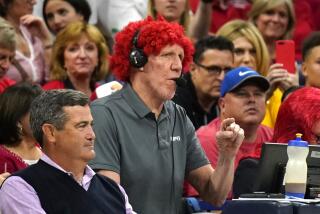A Welcome Visit From L.A. Alum Walton
- Share via
When pianist Cedar Walton moved back to the East Coast early this year, Los Angeles lost one of its important jazz assets. Admired by musicians and fans, comfortable in a wide range of jazz settings, Walton has been a vital figure since he burst onto the scene in the late ‘50s with, among others, John Coltrane, Art Blakey and Art Farmer’s Jazztet.
On Friday night, Walton--in town for a commercial gig as an accompanist--made a brief, one-night stop at Rocco’s in Bel-Air. And the room, understandably, was packed with listeners eager for the opportunity to experience his authoritatively assured, warmly communicative playing.
Working with bassist Tony Dumas and drummer Ralph Penland (replacing Billy Higgins, reportedly not feeling well), Walton stuck with a tried and true program--one with the benefits of being both musically demanding and melodically familiar. Starting with the Kurt Weill standard “My Ship,” he continued with his own “Cedar’s Blues,” Harold Arlen’s “Over the Rainbow” and a Thelonious Monk medley that included “Evidence,” “Off Minor,” “Ruby” and “ ‘Round Midnight.”
It was the sort of material that Walton revels in playing--material that allowed him to indulge his gift for melodic paraphrase, his ineffable rhythmic drive and his ease with harmonic alterations. Throughout the set he was also his characteristically humorous self, constantly tossing in brief, fragmented quotes from other tunes. And his most impressive talent, the manner in which he builds improvisations with the structure of compositions, was in full flower. Despite the impromptu quality of the engagement, Walton led his accompanists through spontaneous interpretations that emerged with the clarity of well-rehearsed arrangements.
Dumas and Penland, consummate professionals who seem capable of playing in every imaginable setting, were in rare form, clearly enjoying the interaction with Walton. And Penland, who is fully capable of bombastic drumming, shifted into subtle mood in both his soloing and accompaniment, offering rare testimony to the benefits of musical understatement.
More to Read
The biggest entertainment stories
Get our big stories about Hollywood, film, television, music, arts, culture and more right in your inbox as soon as they publish.
You may occasionally receive promotional content from the Los Angeles Times.










